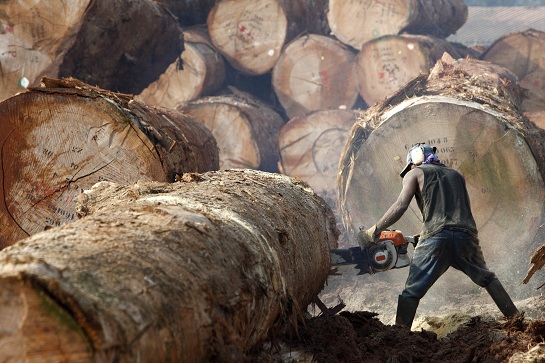- Bringing logging companies in line with FSC certification standards in the Congo Basin
- Building knowledge about climate change adaptation in Congo Basin
- New 10-year research initiative to protect forests and reduce risks for forest communities
- Bioenergy, sustainability and trade-offs
- Landmark findings show mangroves key to fighting climate change
- Rural poor rely on forests for nearly a quarter of household income
- Integrating the management of timber and non-timber forest products in the Amazon
- Reviving frankincense and myrrh for livelihoods and conservation in Ethiopia
- Urgent call for action at Forest Day 5
- Shining a spotlight on Indonesia’s forests
- Pathways to impact

Bringing logging companies in line with FSC certification standards in the Congo Basin
CIFOR research in the Congo Basin analysed the certification for forest products and found that government standards are often less stringent than those from the Forest Stewardship Council (FSC) – and that logging companies adhered to standards which fell somewhere between the two.
"CIFOR's findings contributed to the FSC conducting an audit of all certified logging companies. As a result, a number of firms have already started to adapt their management plans to bring them in line with FSC standards."
FSC is an independent, multi-stakeholder organisation that promotes responsible forest management. FSC certification is meant as a stamp of approval to consumers worldwide that forest products are the result of environmentally and socially responsible forest management. About 5.2 million hectares of forest in the Congo Basin are already FSC certified.
The research finding stemmed from an analysis of the management plans of a number of certified logging companies. While the standards the companies were typically following were superior to what was legally required, they were not sufficient to fully comply with the FSC requirements for responsible forest management.
‘The tendency was for companies to use the management plan more as a vehicle for getting the government’s approval than as a blueprint for responsible forest management as required by the FSC,’ said Paolo Cerutti, leader of the CIFOR study. ‘In that way they could meet their legal obligations but avoid fully adhering to the FSC logic of responsible forest management.’
CIFOR's findings contributed to calls by NGOs for a moratorium on FSC certification of industrial-scale logging in the Congo Basin. The FSC responded by conducting an audit of all certified companies. As a result, a number of firms have already started to adapt their management plans to bring them into line with FSC standards. In addition, CIFOR is working to ensure that all of the certifying bodies used by the FSC base their assessments on the same standards when evaluating logging companies.
